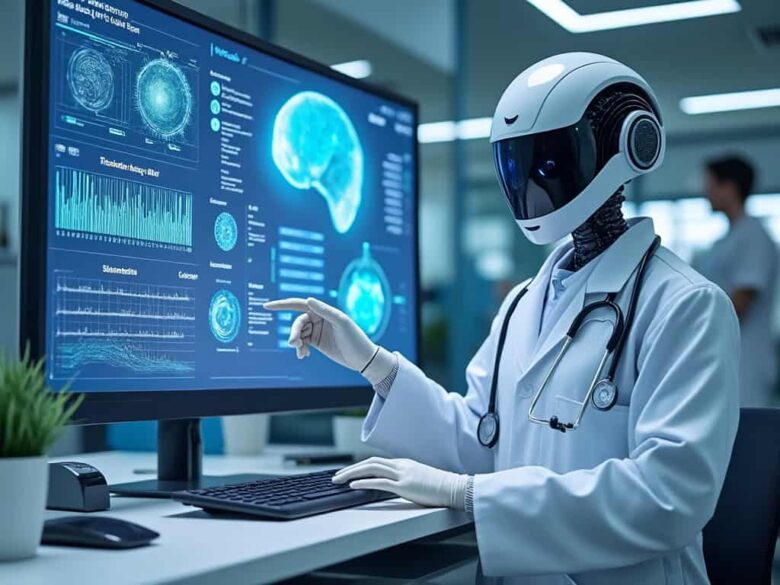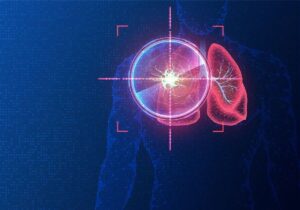Artificial intelligence has become a significant force in the transformation of many sectors, and healthcare is not an exception. In the past few years, the integration of AI in medical technology has transformed the way the healthcare system is run and the way diseases are identified and treated, as well as how treatment is designed. AI is a term used to describe computer systems that are able to examine data, draw lessons from it, and then make predictions or decisions. In the field of healthcare, AI is not replacing doctors but instead aiding them to make more precise, quick, informed, and timely decisions. Its capacity to process enormous quantities of data at lightning speed makes it a valuable tool in laboratories, clinical settings, and even at home. As AI gets more advanced, its impact on the medical field and the patient’s outcomes is growing more profound.
Improved Diagnostic Accuracy Using AI
One of the most prominent areas in which AI can make a difference is in the field of diagnostics. Medical professionals generally depend on their experience and expertise to interpret laboratory results and scans. Human errors or negligence can cause misdiagnosis or delay in diagnosis. AI-powered diagnostic tools examine images like X-rays, MRIs, and CT scans to detect abnormalities and patterns that may not be noticed. They are trained by using millions or thousands of medical images. This lets them detect subtle signs of disease like stroke, cancer, or heart problems with a high precision. The result helps doctors confirm their findings and catch crucial issues earlier that can greatly increase the chances of a patient’s recovery.
Streamlining Administrative and Clinical Workflows
AI can also streamline the routine of medical institutions. Tasks like scheduling appointments, coordinating the patient’s record, billing, and coding are vital but can be time-consuming. AI tools are making use of AI to automate administrative tasks and allow healthcare professionals to concentrate on the patient’s treatment. Artificial assistants that are powered by AI are able to handle appointments and reminders, whereas natural language processing can help extract important information from clinical notes. In clinical workflows AI assists in identifying patient cases, providing treatments, and aiding in making decisions for patients through providing recommendations based on evidence. The result is an effective healthcare system that runs seamlessly and offers more efficient treatment for patients.
Enhancing Treatment Personalization
Another major innovation brought about via AI is the capability to provide personalized treatment plans. The genetic makeup of each person’s lifestyle and reaction to medications can be very different. AI can analyze this complicated information to customize treatments to meet the individual requirements of every patient. In the field of oncology, for instance, AI systems can assess the genetic characteristics of a tumor and then predict the most likely treatments to be successful. For chronic diseases, like heart disease or diabetes, AI can help monitor the health of a patient’s day-to-day data and suggest lifestyle modifications or medication changes. A personalized approach to care does not just improve outcomes but also decreases the risk of negative side effects, improves patient satisfaction, and maximizes the utilization of resources.
Revolutionizing Medical Imaging and Radiology
Radiology is now one of the primary fields utilizing artificial intelligence. The procedure of interpreting medical images takes a lot of time and the highest level of expertise. AI aids radiologists by identifying the areas of concern in scans and preparing preliminary reports. These tools do not just help save time but also enhance the consistency of reports and decrease variability in interpretations. Certain AI tools can also track the progress of disease through time by comparing present and historical images, offering information that aids in the planning of treatment. In hospitals that are crowded, where radiologists have to deal with the number of scans being performed, AI makes sure that no patient is missed and that the most urgent cases are prioritized for examination.
Enhancing Drug Discovery and Development
The creation of new medicines is a long and costly procedure, which often takes years of study and billions of dollars. AI is currently being utilized to speed up the process of discovering new drugs through the analysis of massive datasets connected to diseases chemical structures, as well as clinical trial outcomes. AI can help identify potential drug candidates, determine their efficacy, and simulate how they work with human bodies. This eliminates the need for long trial-and-error procedures in the lab and helps bring efficient treatments to market quicker. In times of health emergencies such as pandemics, AI-driven development of drug tools has proven to be particularly useful in the search for feasible treatments within a fraction of the time normally required.
Improving Remote Monitoring and Virtual Care
AI can also play crucial roles in enhancing accessibility to healthcare via the remote monitor and online health. Patients with chronic ailments or recovering from surgery can have their health monitored from home by wearable devices that record health information such as heart rate, oxygen levels, blood pressure, and much more. AI analyzes the data in real-time and alerts healthcare providers when there are any suspicious trends that are identified. Virtual care platforms based on AI can offer symptom checks as well as medication reminders and even support for mental health by using chatbots or digital assistants. This method enhances the quality of healthcare for patients who might not have access to hospitals, cuts down on unnecessary visits, and helps patients take care of their health better.
Conclusion
Artificial intelligence is not just improving medical technology; it is changing the possibilities of healthcare. Through improving the accuracy of diagnostics as well as streamlining operations and providing personalization of care and research into drugs, AI is creating a more efficient and patient-centric medical system. The ability of AI to analyze and process vast amounts of information allows for more informed decision-making, prompt intervention, and more effective treatment strategies. For patients that require treatment, this means better outcomes, quicker diagnoses, and access to more affordable healthcare. Since AI continues to develop and be integrated into every aspect of healthcare, it has the potential for a future in which healthcare is not just smarter but also more compassionate and sensitive to the specific needs of each patient.
FAQs
1. What’s the purpose of AI in the field of medical diagnosis?
AI aids doctors by analyzing medical information, images, and signs to identify ailments more quickly and with greater accuracy, which helps reduce mistakes and assists in the diagnosis of diseases earlier.
2. Could AI take over doctors in the near future?
AI was designed specifically to assist rather than replace medical experts. AI provides valuable information and efficiency, but it still needs human supervision and judgment for healthcare decisions.
3. Is AI employed in the field of surgery?
Absolutely, AI is used in robotic surgeries to aid in accuracy, speed of decision-making, and real-time support and to decrease risks during the procedure.
4. How does AI help in drug discovery?
AI helps accelerate the development of drugs by discovering promising compounds, anticipating the behavior of drugs, and predicting results, which reduces time and money in research.
5. Does patient data remain secure when making use of AI in health care?
The majority of AI systems for healthcare adhere to strict privacy and data protection rules, which ensure that patient data is secured and encrypted.




